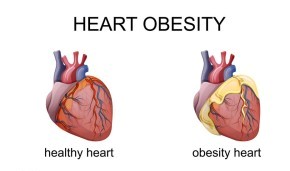The Effects of Obesity on Heart

Are heart disease and obesity related?
Obesity is a condition in which you have a lot of excess body fat. Mild obesity is body weight 20% to 40% more than your ideal body weight. Moderate obesity is weight 40% to 100% more than ideal. Severe, or morbid, obesity is weight more than 100% of ideal. Ideal body weight varies with height, frame size, and gender.
Obesity is known to produce changes in the structure and function of the heart. This may happen even if you have no other form of heart disease, such as high blood pressure or atherosclerosis.
What are the effects of obesity on the heart?
As body weight increases, the volume of blood also increases. The increased blood volume forces an abnormally high output of blood to be pumped from the heart even at rest. This makes the heart work harder. The heart chambers stretch and expand. The added workload thickens the heart muscle of the lower left chamber (left ventricle). The thickening affects both squeezing (contraction) and relaxation of the heart. Over time, the heart may not be able to keep up with the load. Congestive heart failure with shortness of breath or fluid buildup in the lungs may be the result.
Obese people often have high blood pressure. High blood pressure adds to the work of the heart. The heart muscle gets even thicker because of the increased pressure. Normal heart contraction and relaxation are affected, and the heart can no longer pump normally. High blood pressure and abnormal heart function may be improved by losing weight, but drug treatment is often needed.
Obesity also increases the risk of developing diabetes. Diabetes increases the risk of developing heart disease.
Many obese people notice shortness of breath when they lie down to sleep because having a large abdomen can interfere with the function of the diaphragm. Some very obese people also develop an obstruction of the airway to the lungs when they sleep. The effect of gravity on the thickened tissues and muscles of the throat and neck may serve to block the passage of air to the lungs. This interrupts breathing temporarily, a condition called apnea. The periods of apnea reduce the amount of oxygen in the blood. The reduced blood oxygen due to apnea can affect the heart’s rhythm and may be responsible for some cases of sudden death during sleep.
Low blood oxygen may also cause an increase in blood pressure in the lungs. Persistent increase in lung blood pressure eventually puts a strain on the right ventricle of the heart. The right ventricle, which pumps blood through the lungs, can’t keep up with the demand. Symptoms of breathlessness or fluid buildup in the body may result.
Does obesity cause coronary heart disease and heart attacks?
Most doctors agree that obesity is a major risk factor linked to coronary heart disease, independent of other risk factors often associated with obesity (such as high blood pressure, high blood cholesterol, and diabetes mellitus). You can avoid increasing the risk of heart disease and other illnesses by maintaining a healthy body weight. If you already have heart disease, you can decrease the risk of complications by losing weight. Although you may never reach ideal body weight, your doctor can recommend a diet and exercise program to help maintain your best weight.